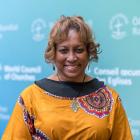In 1619 Angolans were brought from the continent of Africa to the shores of Virginia in what became the United States in North America. Contrary to the popular narrative, they had already resisted their enslavement in Angola.
They, like many among millions of Africans who were enslaved in one of the most barbaric systems of enslavement, chattel slavery, resisted and rebelled against their enslavement. This often-hidden history speaks to a convergence of spirit, determination, agency and faith that caused them to rise up despite enslavement. Even in the earliest days of colonialism and racialized evil, they had already begun their journey of marching towards freedom even before their departure from their African homelands.
This march of resilience and resistance against injustice has continued over the centuries in the USA and globally. Four-hundred-and-one years later at the recent 2020 March on Washington, held during Black August not long after the actual anniversary date of the 1619 arrivals, Pan African peoples returned to the historic events of 28 August 1963. This return included the recent and current movements of Black Lives Matter. It was a time to not only rally the vision of freedom but it was also a return that honored the historic places of the legacy of resilience and resistance at least since 1619. It was a momentous occasion that took place at a tipping point in the USA. A time when Pan African peoples are highly organized and visible about the overdue season for structural change needed to repair racial inequities of the past and today.
The messages, expressed through the call and response oral tradition of people of African descent in the US, inside and outside of worship, was a dominant aspect of the March.
“Say her name: Breanna Taylor…!” “Say his name: George Floyd…!” “Get into Good Trouble (Congressman John Lewis)!” “We are the Ones we have been waiting for!” “No Justice, No Peace!” “Vote Like Your Life Depends on It!” “Support the George Floyd Justice in Policing Act of 2020!”
Thousands were present, in person, to engage this tradition of calling on the ancestors who have been recently killed and the call for structural changes while many more tuned in online throughout the USA and globally.
This calling of names complemented the multi-generational speeches from faith leaders, Congressional leaders, celebrities, and highly visible families of the deceased. The speeches lamented the untimely deaths of the departed and expressed the outrage of lack of due process to convict the assailants. It was a time of remembering the recent passing of icons like Congressman John Lewis, Rev. C.T. Vivian and Charles Evers.
Martin Luther King III, a convener of the “March,” and his daughter, Yolanda Renee King., also spoke to their own sense of tragic loss of family members including their father and grandfather, Rev. Dr Martin Luther King and grandmother/great grandmother King. They stood in impassioned solidarity with the families most affected by recent violent deaths when they spoke to the humanity of Rev. Dr Martin Luther King as a father beloved and a father departed due to the gun fire of an assailant.
They also spoke of hope when they urged the crowd to fully embrace this moment as a time when “we are the ones we have been waiting for” and to further the dream of freedom for all. While most of the speeches expressed lament they also spoke of hope, persistence and faith as well as public policies being discussed by the Congress with the leadership of the Congressional Black Caucus—public policy proposals such as the George Floyd Act that seeks police reforms and House Resolution 40 that advances a proposal to create a commission to explore the case for reparations.
This kind of messaging was also echoed at parallel events related to the in-person March on Washington. One of these events was convened by the National Association for the Advancement of Color People (NAACP) and another by the National Black Convention. The NAACP convened a virtual March on Washington. There were similarities to the agenda at the in-person March on Washington. They also placed an emphasis on voting and the census.
The National Black Convention, emerging out of the Black Lives Matter movements, honored the historic National Black Political Convention in Gary, Indiana in 1972 that brought together diverse voices within the Black political landscape in 1972. In 1972 this conference included people like Coretta Scott King, Rev. Jesse Jackson etc.
This virtual “Convention” lifted up the reimagining and engagement of the building up of sustainable local community work and its connectivity to related public policy platforms locally and nationally.
The in-person March on Washington ended at the Potomac River where enslaved Africans arrived and built the Capitol area of D.C. The Martin Luther King memorial stands there as well. It was an appropriate venue to finally commemorate and remember Pan African people and movements of resistance to injustice led by faith and hope in the past, in this moment and the future.
